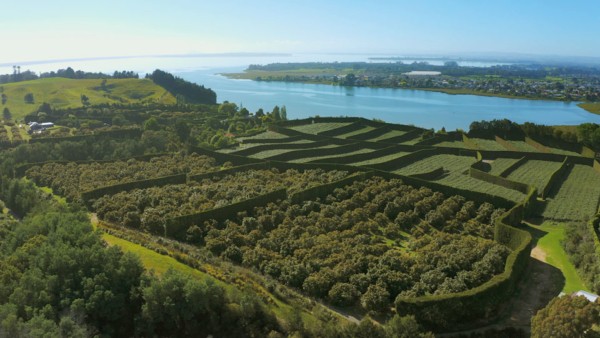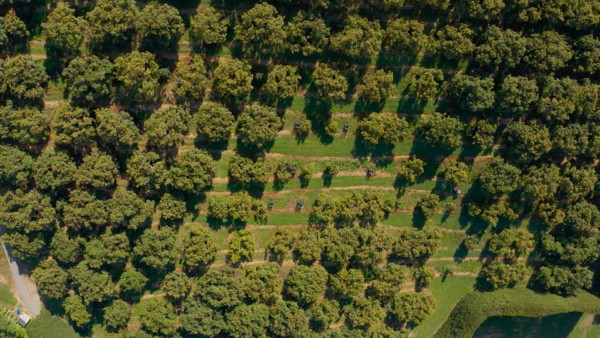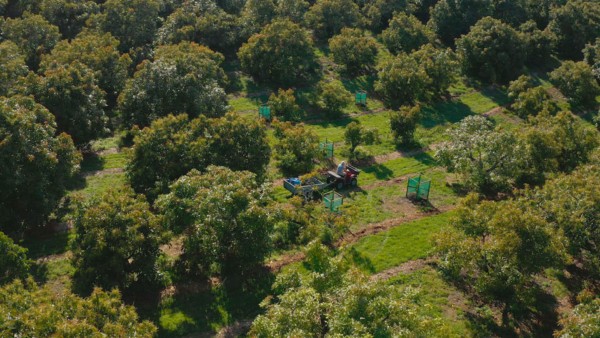McGillivray’s Avocado Orchard
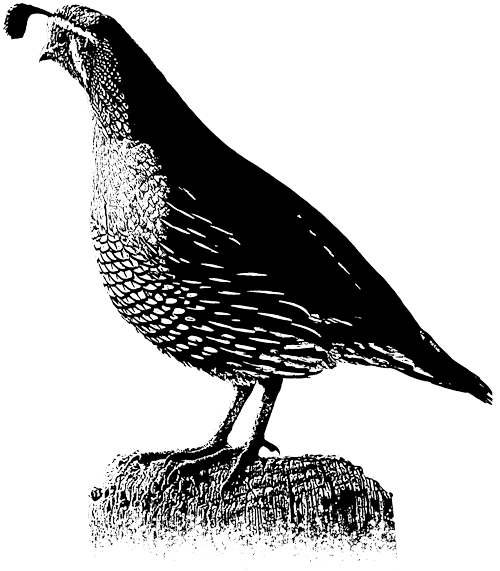
Smashing environmental goals in Katikati
A couple growing avocados are prioritising the environment in their quest for premium quality fruit for New Zealand export markets.
On a walk through Wilson and Barbara McGillivray’s avocado orchard on the outskirts of Katikati, you quickly discover you’re not alone.
Birdsong greets new arrivals and sprightly pīwakawaka (fantail) quickly make their presence felt. Sunlight breaks through the canopy, throwing light on the orchard floor where quail scurry between rows of mānuka, flax and pittosporum, planted to attract bees and birds which thrive in the local ecosystem.
In the McGillivrays’ orchard, every plant and tree has a special role to play.
“We’re very lucky with our biodiversity,” says Barbara. “We spend a lot of time trying to preserve it.
“I do a lot of environmental work at Aongatete Forest in the Kaimai Ranges, so I’ve learned how important it is to control the introduced predators from coming in.
“By trapping and keeping their numbers down, we’re increasing the population of local nesting birds and having them in our orchard makes the whole experience of growing avocados more enjoyable.”
Pest control is a labour of love for the McGillivrays who were recognised for their environmental efforts in 2018 when they became the Bay of Plenty regional winners of the Ballance Predator Free NZ Farm Award.
It recognises their achievement in tackling rats, stoats, feral cats and possums. Counting carried out every June shows their efforts are paying off, with pīwakawaka and other birdlife flourishing.
A love for growing
Their shared passion for the environment has developed over more than 40 years of working the land and operating several horticultural businesses. As a young married couple they developed a kiwifruit orchard at Oropi, and Wilson operated Waimapu Packhouse & Coolstore in Katikati.
After the packhouse was sold, they lived in Whangamata for five years before returning to Tauranga where they bought a 10-acre bush block at Whakamarama.
“Wilson cleaned it up and after three years there wasn’t a weed or possum on it. But he was bored and needed something else to do,” says Barbara, smiling.
Wilson spotted an opportunity to get into avocados with his brother by buying what was in 2011 a relatively under-developed orchard at Katikati that had, under previous owners, operated as a dairy farm, scrap yard and, once upon a time, hosted gymkhana race days.
“We’re told they squashed 2000 cars here and sent them off for scrap metal. We’re still finding old bits of car lying around,” Barbara says.
Relishing the chance to try something new, purchasing the avocado orchard also satisfied the couple’s desire to return to growing.
“We’ve always liked seeing something grow from small things,” says Wilson. “This orchard had trees that were about 10 years old in pretty average condition. Our first soil test report found the only element not in the extreme low range was aluminium. Nutritionally, the orchard was in very poor health.”
Neglected trees had also led to overcrowding, so the McGillivrays immediately removed every second avocado tree, as well as pine trees that heavily shaded the orchard.
The brothers subdivided to create separate businesses, with Wilson and Barbara taking ownership of 12ha, including 5ha of avocados on three main production blocks.
The couple have now spent 10 years on Awatea Orchard and are proud of its development and thoroughly enjoy the lifestyle that comes with it.
“We were attracted to avocados because none of the work is absolutely time-critical,” he says. “Spraying is time-sensitive but in reality, we have time to focus on pest control and all our other interests.”
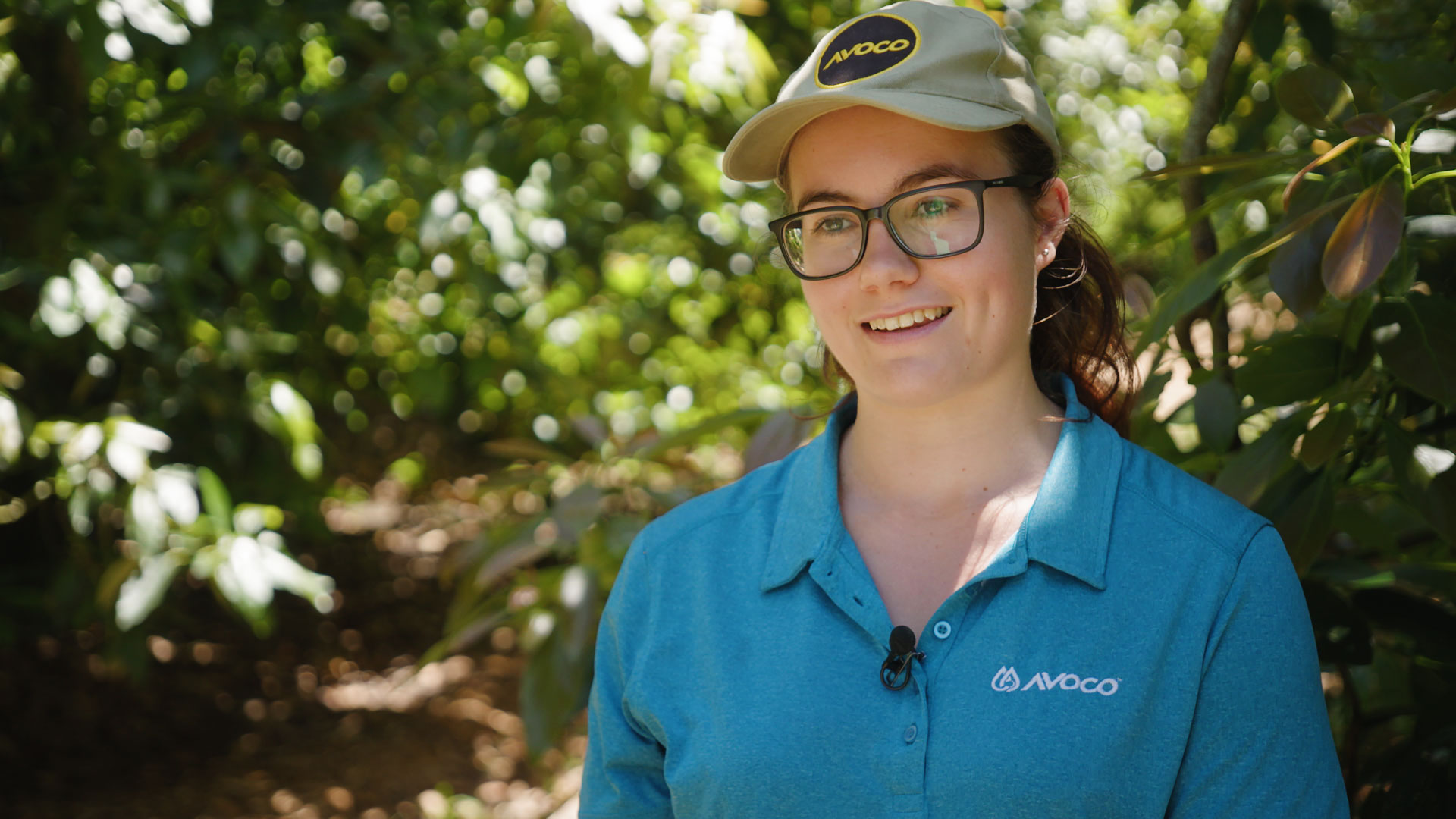
“To improve the quality and performance of our fruit, we identified that we needed to work individually and collaboratively across all areas of the supply chain – from the orchard to the market.”
Avoco’s Quality and Export Systems Manager, Danni van der Heijden
Technical input valued
The couple export their avocados through Avoco, a grower-led avocado marketing company with key customers in Australia and Asia. Their fruit is packed with Trevelyan’s where Wilson has a leadership role on the packhouse’s grower committee.
His post-harvest experience has given him a soft spot for the contractors that growers rely on throughout the year. This includes pruning contractors and picking teams who come under pressure at harvest time.
“I look at the industry from both sides. Yes, I’m a grower but we need to get alongside our advisers and contractors and trust their advice too.”
The McGillivrays place enormous value on technical advice and in developing their orchard, they have leaned on Avoco’s Quality and Export Systems Manager, Danni van der Heijden, for support.
“During a replanting programme a few years ago, Danni was a tremendous help. We still refer to some of the regrafted trees as Danni’s trees! They’re good performers for us.”
Danni says the McGillivrays are great examples of growers who want to maximise the potential of their orchard and grow avocados to the highest export standards.
“In my role, I help growers understand what they need to do to meet those standards.
“Science informs everything we do and part of my job is to bridge the gap between research and the grower.”

Improving the quality of New Zealand avocados has been a major focus for the New Zealand avocado industry in recent years. Avoco developed a successful Quality Business Plan for the Australian market two years ago and backed that up with a similar plan for its developing Asian markets in 2020.
“To improve the quality and performance of our fruit, we identified that we needed to work individually and collaboratively across all areas of the supply chain – from the orchard to the market.
“That approach enabled us to review and address all the elements influencing fruit quality. We looked at the role everyone plays, starting with growers.”
It’s work that has resulted in satisfying results for growers and customers in offshore markets.
Last season Avoco handled a record volume of 2.9 million export trays and sold 71 per cent directly into the premium Australian supermarket chains. Avoco’s relationships with Australian retailers, coupled with economies of scale and strong market discipline, generate solid Orchard Gate Returns every season.
Wilson says healthier returns gives growers the ability to focus more freely on practices and professional services that deliver better fruit quality and tree health.
“I was doing the pruning myself, but when we got someone else in it made a huge difference to production. Of course, as growers we’re emotionally bonded to our own trees and we don’t like to see fruit cut off. Now we make pruning our number one priority.”
The McGillivrays use Chris and Amy Turner for pruning and picking and make sure all their fruit can be picked from a 6m hydralada. Trees are pruned and shaped to allow more light inside the canopy.
This approach sees fruit grow from the tallest branch right down to ground level. “That’s the easiest fruit to grow because it’s so easy to pick and spray and it doesn’t get damaged by the wind,” says Wilson.
Irrigation, installed in their orchard eight years ago, is used every summer – an investment the couple say was worth every cent.
“Our climate is warming and forecasts suggest our summers will only get drier. We want to avoid trees going into drought stress, especially during flowering,” says Wilson.
They use hives from a local beekeeper during the critical six-week pollination period, starting early October. “We like to have the bees here for the first real flush of flowers because you never know when you’re going to get the right temperatures to make them set.”
“We’re very lucky with our biodiversity,” says Barbara. “We spend a lot of time trying to preserve it.
Focus on sustainability
Outside of the avocado flowering window, bees continue foraging in their orchard thanks to wildflowers and natives planted around the fringes to increase biodiversity.
The couple’s sustainable approach to growing means they also look at ways they can minimise the number of sprays they apply without compromising fruit quality or tree health.
For three years they have participated in a trial involving Plant & Food Research to find softer ways to control leafroller. To maintain AvoGreen compliance for exporting their fruit, Barbara is responsible for plant pest monitoring on their orchard – a task she handles confidently after many years of doing KiwiGreen monitoring.
“We very quickly know when we have pest pressure patches in the orchard. Wilson does all our spraying but the decisions I’m making are quite important because they impact the whole crop economically. But having lived here for a while, I’ve got a feel for how to manage things and maintain our spray programme in a way that fulfils all our requirements.”
The avocado industry encourages growers to apply copper to their trees as an effective way to prevent fungal rot, which starts in the orchard through infection of fruit, but usually doesn’t emerge until post-harvest.
Although copper applications are a key feature of fruit quality control, the couple take additional measures in their orchard to prevent fruit rot. This includes letting sunlight in and removing dead wood and plant material from around their trees.
“We like to be proactive and make a point of looking after our soil health,” says Barbara. “More people are realising that to grow sustainably you can’t keep harvesting year after year without giving back to the soil in some way. That doesn’t mean you have to keep applying chemical fertilisers either. Our grandfathers knew this, but over the years their knowledge has been lost.”
The McGillivrays are advocates for vermicast compost, sourced from worm farms, which they love for its natural beneficial soil microbes. They apply 10 tonnes per hectare in spring and Wilson believes it’s generating positive results across the whole orchard.
“It has significantly increased the calcium levels in the leaves and we know calcium is very important for fruit quality.”
They also avoid mowing or spraying when it’s wet to avoid heavy machinery compacting the soil.
Wilson McGillivray on better Orchard Gate Returns
“If we could pick the whole lot in spring, we’d end up with a very high packout because the winds and insects haven’t had a chance to do any damage. But we support the industry and help Avoco meet the needs of its customers in Australia after Christmas. This helps the whole pool by delivering better Orchard Gate Returns at the end of the season.”
Aiming for consistency
The biennial bearing nature of avocado trees has plagued many growers, with the industry working hard to identify solutions that deliver more even fruit production, year after year.
The couple have a few trees that have “on and off years” but Wilson says the measures they’ve taken, such as more intensive pruning, support more consistent bearing. “Pruning is the real game changer for us but location may also play a part. Overall, we’re very lucky.”
They pick half their avocados in September before flowering and the remaining half in December, often between Christmas and New Year.
“We have several blocks prone to wind. If fruit is in condition to be picked and big enough, we will strip pick those blocks.
“If we could pick the whole lot in spring, we’d end up with a very high packout because the winds and insects haven’t had a chance to do any damage. But we support the industry and help Avoco meet the needs of its customers in Australia after Christmas. This helps the whole pool by delivering better Orchard Gate Returns at the end of the season.”
As much as financial returns are important to their overall business, the McGillivrays say avocado growing is about so much more.
“It’s so special to create a food product that is good for everybody – from tiny babies through to the elderly,” says Barbara.
“It gives us an absolute buzz when friends and family tell us how much they love the taste of avocados from our orchard. It’s nice to grow a fruit that’s so healthy and working the orchard keeps us young.”
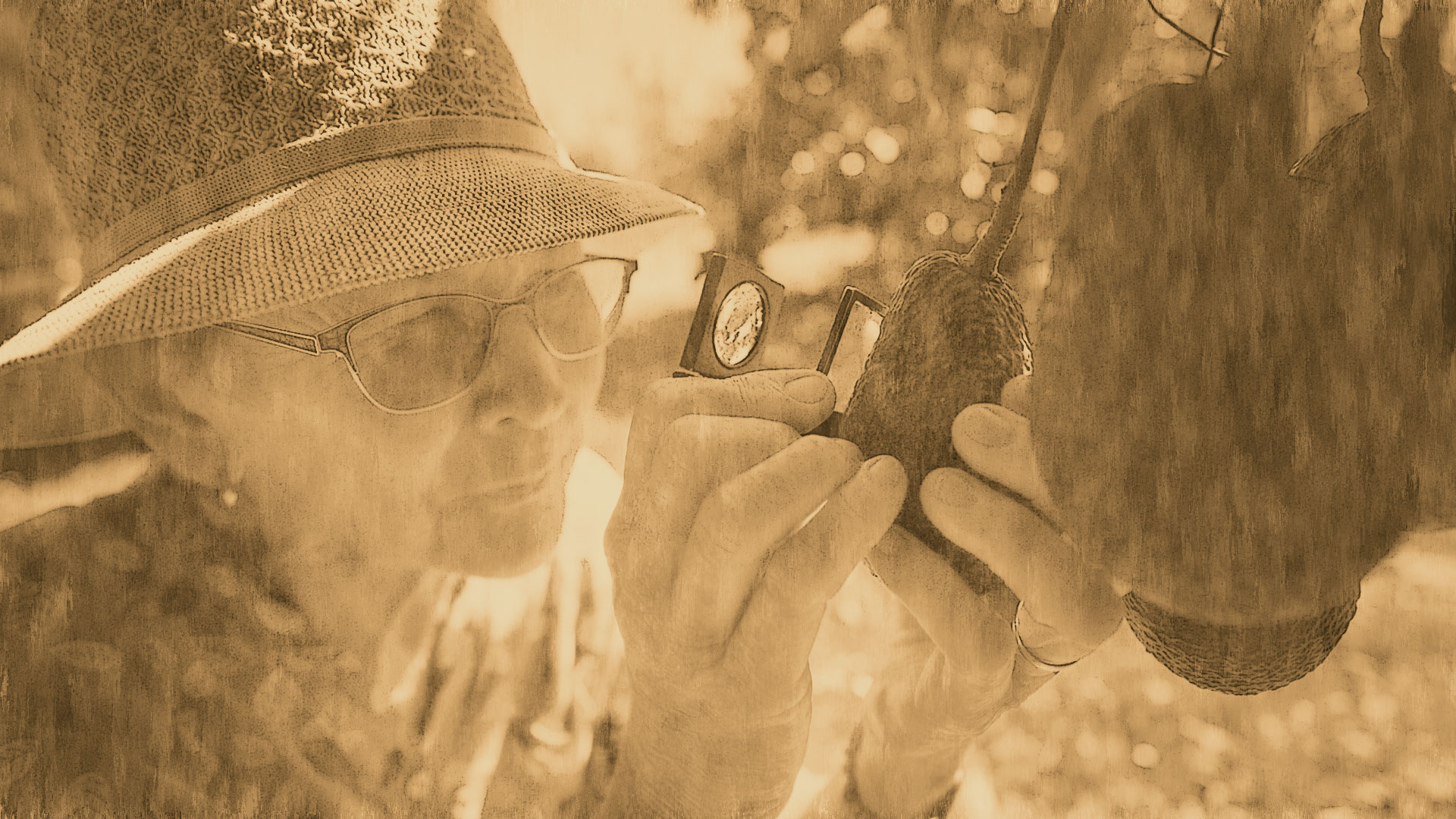
Partnering with the best
In supplying Avoco, Wilson and Barbara have joined hundreds of other growers who have partnered with the industry’s most experienced technical experts, exporters and fresh fruit marketers.
Avoco’s leadership and extensive commercial experience gives it the ability to plan and execute an export marketing strategy that delivers solid returns to growers in years of light and heavy volume.
It has a network of the best selection of customers across Australia and Asia where fruit is marketed under the AVANZA brand.
What’s more, its commitment to technical excellence means growers will always be supported with best practice fruit quality advice and technical know-how.
JOIN
AVOCO
Follow hundreds of other growers who have joined us and partnered with the industry’s best, most experienced technical experts, exporters and fresh fruit marketers.
